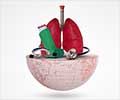Treatment
Treatment of male breast cancer depends on the stage of the cancer, overall health of the patient and patient preference. Treatment often involves
Treatment of male breast cancer includes the following:
Surgery
- Simple mastectomy: In this procedure, the entire breast tissue is removed. Structures removed in simple mastectomy include the lobules, ducts, fatty tissue, and a strip of skin with the nipple and areola.
- Modified radical mastectomy: Here, all of the breast tissue and some lymph nodes in the axilla (underarm) are removed. Lymph node removal can lead to arm swelling called lymphoedema.
- Sentinel lymph node biopsy: This is actually a test for cancer spread. A sentinel node is the first lymph node to which cancer cells spread. If examination of this lymph node reveals no cancer cells then it may indicate that the cancer hasn’t spread beyond the breast tissue.
Radiation Therapy
Radiation therapy is a cancer treatment where high-energy x-rays or other types of
Chemotherapy
Chemotherapy involves the use of
Hormone Therapy
Most types of male breast cancer are hormone-dependant and respond well to treatment with hormones. Tamoxifen is one such drug used in hormone therapy.
Targeted Therapy
Therapies that target specific abnormalities within cancer cells are available.
- HER2 is a protein produced by some breast cancer cells. It is needed by the cancers for growth and survival. Trastuzumab (Herceptin) and lapatinib (Tykerb) are two drugs that target this protein. HER2-positive tumors thus respond to these drugs.
- Bevacizumab is a drug that tampers with signals that help tumors to grow blood vessels, thus cutting down the blood supply of the tumors. The use of this drug is however controversial, and the FDA is yet to approve it. Researches failed to prove that the drug provides any survival advantage for patients.








